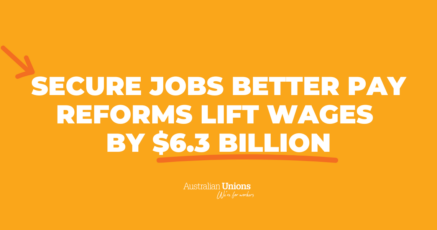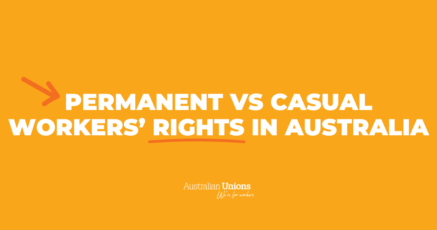By Chloe Ward
You’ve heard a lot from me about the dangers of the Morrison Government’s IR Omnibus Bill. That’s because it’s important. It will entrench casualisation, undermine wages and conditions, and stall Australia’s recovery from the Covid-19 recession.
You don’t need to hear all that again, not from me, or from the countless politicians, experts, and union movement leaders who’ve weighed in against the Bill in the past few months.
Behind all these arguments—my arguments, the arguments of politicians and unionists who see through the Bill, and arguments from experts, from scientists to economists—are stories from the people who will bear the brunt of the Government’s so-called “reforms” if they do pass the Senate next week.
On her recent trip to Townsville, ACTU President Michele O’Neil spoke to workers about the what the IR Bill means to them. Workers like Llwyd Saul, a Brisbane electrician caught on what he calls the ‘labour hire roundabout’. Saul works mostly through labour hire companies, with contracts only lasting three to six months. When he applies for permanent roles, this record comes back to bite.
“When you do get a phone call back, they generally look at your resume and go ‘oh you jump around a fair bit, so you’re not really the person we’re looking for,” he told O’Neil.
Of the IR Bill, he says it “just gives the employer so much power, and as it is they’ve got way too much”.
Gaby Norman, a nurse and union delegate in Townsville, is worried about what casualisation means for economic recovery.
“I think definitely on the back of a pandemic at the moment, we’re already seeing instability within the workforce and a changing workforce,” she told O’Neil.
“Moving forward into economic recovery, we really want more permanency and be able to see growth within the economy and I think having casual jobs is not going to be helpful for that.”
18-year-old Rylee Miller should be planning for a secure future. But, working casually in aged care while also studying nursing, she can’t guarantee her security from week-to-week, let alone think about the years ahead.
“Am I going to make my bills? Am I going to be able to feed myself?” she asks herself constantly. The passage of the IR Bill would only add to Miller’s uncertainty.
“I’m worried that if it gets passed, I might not have a job, I might not be able to support myself.”
And it’s not just her.
“It affects everyone. There are many people within my workplace who have two jobs just to support their family.”
Sherree Clarke also works in aged care. The unpredictable nature of her work—even during the Covid-19 crisis, when frontline services needed better staffing, not less—means she can’t take out a lease on a home with confidence. Right now, Clarke lives in a caravan park. Her situation could get worse.
“Anything happens further to my work and my conditions I face being homeless. I’ve got nowhere else to fall after the caravan park.”
For Clarke, the costs of insecurity are both material and personal. She has had to give up study, and the ‘negative cycle’ of chasing shifts means she loses chances to connect with her family.
“I can’t plan to attend family events because if they call me in at the last minute, if I say no to the shift I don’t get offered another shift. And, plus, I need that shift just in case I don’t get shifts the next fortnight.”
So why is the Government still pursuing the Bill? Clarke thinks Coalition MPs pushing the Bill don’t understand what it will do to workers.
“I don’t think they’ve walked in our shoes. I don’t think they knew what it’s like to chase hours, to chase work … I think the Government’s out of touch.”
She’s right. But you can still send a message to Government MPs and crossbench Senators, and help stop this dangerous, out-of-touch legislation from becoming law.






SHARE:
Meet the workers facing the worst of the Morrison Government’s IR Bill